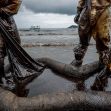A grain terminal company operating in Washington state has agreed to pay close to $1 million to settle a lawsuit that challenged the company's compliance with the Environmental Protection Agency’s guidelines.
The non-profit environmental organization Columbia Riverkeeper brought forward the lawsuit alleging that the company, Export Grain Terminal, LLC (EGT), was not operating with the proper permits. Columbia Riverkeeper detailed in their lawsuit that EGT had violated the Clean Water Act because the company did not have an industrial stormwater permit. Under this permit, the company would have been required to monitor and report any leakage from the facility.
As a result of the settlement, EGT has agreed to pay Feeding Justice $715,000. The settlement will go toward paying for water quality projects as they pertain to the Columbia River and the surrounding area. EGT will also pay an additional $220,000 to cover the legal costs of Columbia Riverkeeper.
EGT pushed back in a statement contending that although they have settled, they were told by the Department of Ecology that they did not need the industrial stormwater permit in order to operate out of the Port of Longview. The company explained, "EGT is committed to being a good corporate citizen, making operational decisions built on a foundation of ethical leadership, accountability, and environmental stewardship." EGT adds, “While the company disputes Columbia Riverkeeper’s claims, EGT has agreed to the Consent Decree to affirm its commitment to the local community and to avoid costly litigation.”
Although the company denies the allegations made against them, they have agreed to obtain the necessary permit and will conduct quarterly reports related to its stormwater discharge for the next three years. The company has also agreed to create a draft pollution prevention plan and will also reroute one of its spouts away from the Columbia River. Among other settlement details, EGT has agreed to hire an outside engineering firm to help the company construct spout gates to minimize the release of grain particles and grain dust into the environment.
In the original lawsuit, the Port of Longview was also named as a defendant along with EGT. Since then, the two defendants have been separated into their own cases, and the allegations against the Port of Longview are still pending.
This latest lawsuit comes after a similar case in which Columbia Riverkeeper sued Kalama Export Company, LLC for violating similar laws after failing to comply with the National Pollution Discharge Elimination System. That lawsuit filed in 2020 accused Kalama Export Company of polluting waterways by discharging stormwater and other pollutants into the Columbia River. That case also resulted in a settlement.






